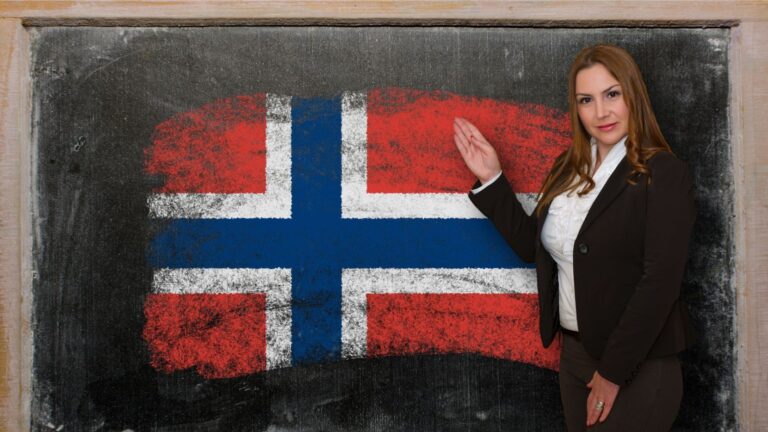Struggling to land a job in Norway as a foreigner? With thousands of failed applications and years of frustration, this brutally honest account reveals the harsh realities of the Norwegian job market—and what it takes to survive.
Are you a foreigner thinking about moving to Norway and looking to land a job? Perhaps your partner is Norwegian, or you’re looking for a cleaner, safer country to live in.

Well, this article should help give you a little more colour on what you can expect in terms of the local labour market. Disclaimer: it is infinitely harder to land a job here than you probably think possible.
Firstly, I should explain what this article is and what it isn’t. It is not a rant against Norway or Norwegian companies. I understand that I am a guest in Norway, and that things – including the job market – are going to work differently.
It is also not a pity party where I am searching for sympathy in respect of my ongoing frustrations to land white-collar work here. Whilst it may come across as being exactly that, it is more of an honest outline of my experiences being a foreigner looking for work in Norway.
If I had read an honest assessment of the local labour market like this, it’s likely I would have reconsidered a move here. In that respect I hope it gives prospective new arrivals a bit more information about moving here than I had.
Who am I?
Before we begin, it’s perhaps helpful to have a little bit of background knowledge. I’m British, hold a degree in business entrepreneurship, along with a range of professional qualifications within the financial services industry.
Before I moved to Norway I worked at two billion-dollar financial services companies in London, one of which was acquired by America’s largest investment bank, JP Morgan.
I’m also at a B1/B2 level of Norwegian, certified by Kompetanse Norge, the government body for adult learning here in Norway. I hope that this shows that I do have some experience, skills and qualifications to add to the country, even if I am apparently unemployable here.
I am also working moving offices on a ‘gig economy’ basis in Norway at this moment whilst I search for the ever-illusive office-based role (everyone needs to earn money somehow).

To date, this search has spanned three years and constitutes over one thousand unsuccessful applications. I think at this point you’d probably call me mad to keep living here.
To be clear, I never expected everything to fall into my lap. I knew it would take effort, sacrifice and patience to build a life here. I never expected it to be quite such a depressing experience, however.
The below is based on my own experience over several years as a jobseeker. So, here we go. I hope you’ll find this useful.
If you’re going to learn Norwegian, fluency must be the target
When I came to Norway as a jobseeker, I intended to be a ‘good immigrant’. I didn’t expect Norwegians to pander to my English and set about learning Norwegian at Folksuniversitet in Nydalen. For those of you unfamiliar, Folksuniversitet offers adult learning classes in a variety of subjects.
Luckily, I have a Norwegian partner, so I already had a good grounding in the language to build on. The teachers at Folksuniversitet suggested a B1/B2 level of Norwegian is enough to take an initial step into the workforce and is highly valued by domestic companies. Sadly, this hasn’t proved accurate.
Following my studies I took the aforementioned examination to certify my language competency. Armed with a new piece of paper from a reputable awarding body, I hoped that it would complement my native-English, improve my CV and increase my chances of landing an office-based role here.
Except it didn’t. It hasn’t helped one bit. I’ll explain why.
If you’re a foreigner looking for work here, there is a view that your Norwegian will either be fluent or not. You only have to look at a handful of job descriptions to understand that you need fluency in English and Norwegian to be considered.

Often, this is explicitly stated as C1 level. Unless you’re using Norwegian day-in-day-out, C1 level is far advanced. This fact will result in the narrowing of your application opportunity universe.
For the roles I picked up interest in, I was selected based on my English. At no point was my Norwegian mentioned.
Key Takeaway: If you’re going to learn Norwegian to find a job, total fluency must be your target. Sure, having a nice conversation in the supermarket might make you feel good for five minutes, but it’s not going to change your life.
Understand that everything takes an eternity
There is an often-used phrase within the public sector here: Ting tar tid. I’m sure you don’t need a nice shiny B-level certificate in Norwegian to understand what that means. My point is that companies here are in no rush to respond to your endless applications, if at all.
In my own experience, two unsuccessful recruitment processes lasted over 8 months apiece; one I was ghosted on at the eleventh hour; the other the company said that they no longer had the budget to move forward.
I’ve also received polite ‘thanks but no thanks’ emails months and months following face-to-face interviews.
Whilst this is by no means a Norwegian-only problem, it is frustrating to invest so much time and effort into a process, only to be left out in the cold in your underpants.
Key Takeaway: Do not expect recruitment processes to be swift and decisive, or in any way similar to your experience in your own country. Things will take as long as they take.
There is a lack of roles to apply for
It’s common these days to read that most jobs aren’t advertised online. That, in order to be successful, you’ll need to apply directly, or find a decision-maker in your chosen company and embark on a campaign of flattery.
Whilst this is accepted as a fact of life in Norway in comparison to the UK, it reinforces the fact that there are slim pickings of roles actually advertised. Of course, Norway is smaller than the UK, but it is a constant source of bemusement how few roles are available here.

Daily searches on sites such as LinkedIn, Finn.no and Indeed, among others, often return zero application opportunities. Imagine spending hours upon hours searching every week and having zero applications to show for it. You end up losing your mind.
Clearly, if companies are not hiring, there is little we can do as candidates to improve the country’s economic prospects. The issue is for the government to create a pro-business environment that creates jobs and investment.
Of course, there are a plethora of available roles in areas such as software development, consulting and personal care. These are areas that are always in demand in Norway. If you have skills and experience in those areas, chances are your searches will be more successful.
For us foreigners based in Norway, searching for remote-only, global roles, will often return a better success rate than applying domestically.
Key Takeaway: Don’t rely on job sites as your main search tools. Visit company websites and/or drop key decision makers messages, or apply speculatively. Applying for remote-only global roles is also an option.
The jobs that are advertised will be advertised again and again, and again… and again
So, you’ve received a rejection email from an application, only you see the exact same role advertised a couple of weeks later.
You’re confused, but assume that the company may have been ghosted by a candidate or something similar. Then it disappears again. Then it reappears. The same thing happens for months on end.
I’m not even sure if the Good Lord Above Us can work out what is going on in the recruitment industry at this moment in time, but for argument’s sake, let’s assume the company can’t find who they’re looking for.
Key Takeaway: Companies are in no rush to hire. Unless you’re exactly what they’re looking for, they will continue to look for another candidate, for months – if not years – if they have to.
Norwegian government bureaucracy is the 8th wonder of the world
Every immigrant likely has their own tales to tell about obtaining their tax cards and tax numbers. The process is so long-winded and laborious it could have its own article. Let’s just say, it’s not easy.
Again, you just have to accept this for what it is. However frustrating the rules are, they are completely out of your control.
For me, my situation has been clouded by Brexit. Yes, I know it’s our own damn fault. As my working hours become less certain, I wanted to register as a jobseeker with NAV.

Unlike private job boards, NAV has thousands and thousands of listed jobs to apply for. You’d think that matching a job seeker with advertised jobs would be simple, wouldn’t you? Well, it’s not.
What you’ll need here is something called ‘bankID’. Now, no-one wants to you give you bankID: not your bank, not NAV, not the tax office, or the police.
I’ve lost count how many times visits to individual government offices has resulted in a mindless chase of bureaucracy – they all point at each other as a way of pointing you out of the door and becoming someone else’s problem.
If I want to obtain bankID and register as a jobseeker on NAV I will first need to declare a permanent move to Norway. I was recently informed that this process could take up to a year.
I don’t need to register a permanent move, and I don’t have another year to waste – what I need is the ability to expand my employment prospects. This particular piece of bureaucracy seems illogical for someone who already lives and works in Norway.
If you have an EU passport, you should be able to obtain bankID easier than me.
Key Takeaway: Until the government makes it easier to match job seekers with jobs they’re actually looking to fill in the economy, do not expect an easy process. If you do find yourself in a government office for work-related or administrative issues, my strongest advice is to take a native Norwegian speaker with you.
Networks Matter
If you read any article on how to take an initial step into the employment market in Norway, you’ll undoubtedly uncover the same repeated theme: networks matter.
I’ve found that this isn’t so much applicable to your own personal networks of friends and family who are constantly looking for roles on your behalf, but is applicable to university networks.
One company I interviewed with appeared to only hire graduates from fee-paying university, BI (Norwegian Business School) which, if you believe local folklore, is the most revered educational establishment in Norway.
Think of it as the Norwegian equivalent of Oxford or Cambridge. If you’re looking for a job in finance in Norway, if you haven’t been to BI then your chances of success are significantly reduced.

Clearly, this aspect of the local employment market doesn’t contribute much to social mobility. Not everyone can spend thousands of pounds and crowns on education from what is accepted as the best domestic institution for business and finance. That, however, is beyond the scope of the article.
Key Takeaway: Just because you’ve been to a reputable university in your own country, doesn’t mean it will count for anything in Norway. Old university networks and your alma mater only matters if you’ve been to a Norwegian educational institution.
Be honest about your foreign experience and qualifications
An area which I’ve come to terms with in my ongoing fruitless job search in Norway is my previous experience. Just because I have experience at two world-leading financial services companies in London, doesn’t mean that this experience is applicable to the local labour market.
I spent almost five years at an asset management firm that specialised in UK-focused investment products such as Individual Savings Accounts (ISAs) and UK Personal Pensions.
Working for a company that was subsequently acquired by America’s largest investment bank looks great on paper, but the actual experience I gained working with the company’s products does not translate here.
Ultimately, you don’t have UK pensions or UK tax-efficient investment products in Norway.
Key Takeaway: Conduct an honest assessment of your skills and experience and how they will translate into company culture here. If your previous education and work experience relates to the flora and fauna of Australia, chances are your employment prospects will be limited.
Analyse the key industry sectors by employment before you make the move
It’s no secret that Norway is famed for oil and gas. If you have experience, education and skills within that industry your employment opportunities are going to be increased exponentially.
In terms of my background, ‘Financial and insurance activities’ is one of the lowest industry employers, according to data from Statista. Not conducting my own research into the Norwegian employment market by industry sector is no-one’s fault but my own.
Another thing to mention is that Norway is one of the world’s largest public sector employers by percentage. In 2020, the OECD reported that public sector employment in Norway was an astonishing 37.8%.
Above all else, these public sector jobs are likely to demand native-level Norwegian language skills; if you don’t have that, your chances of employment, percentage wise, are not simply reduced, but sliced away by almost 40%.

Key Takeaway: Assess your own skills and experience by the industry you work in. In my own conversations with office-based immigrant workers in Norway, almost all of them obtained their roles via company sponsorship/transfer, or by being headhunted for their existing industry skills. In my opinion, those two avenues offer you the best chance of landing white-collar work here.
There is no real recruitment industry in Norway
Back in Blighty, I often hear from friends and family that they have been contacted by recruiters with exciting employment opportunities.
Whilst my headhunter comment above indicates a buzz of recruitment excitement in terms of bringing foreign talent over to these shores, in the domestic market the recruitment industry is almost non-existent.
Sure, there are a lot of websites that specialise in recruitment here, just like anywhere else. You can spend hours registering your CV, writing nice Norwegian cover letters and uploading your fancy documents, but do you ever hear back? In my experience it’s a waste of time.
The industry simply doesn’t work where you upload a CV and you’re called back within a day or two like the UK.
Again, I am not looking to change the culture here and the sheer volume of applicants means that I do have some sympathy for recruiters who are doing their best in a swamp of endless CVs.
I’m also not an experienced CEO/COO/CTO with international experience, which is where the larger recruiter commissions come from. In my experience white-collar recruitment is largely focused on baby boomer professionals, rather than millennials or Gen X.
Key Takeaway: Do not expect people to contact you on LinkedIn with possible white-collar roles for consideration, or to be contacted by recruiters when you register to their sites. By and large, you’re on your own.
If you do land a role, chances are it will be a means to an end
Everyone needs to make a living. It’s so obvious I shouldn’t have to write it. As you start or continue your job search here, chances are you will need to take any role available to put food on the table and keep a roof over your head.
No one is above a hard day’s work, least of all immigrants trying to create a better future for themselves and their families in a foreign land.
For my own part, I work with Norwegians and immigrants almost every day moving offices for an employment agency. The work is physically demanding, inconsistent and offers zero opportunities for development.
As I stated, I am not looking for sympathy and, if anything, I’m grateful to my current employer for being the only one that has given me any kind of employment opportunity in Norway.
Ultimately, as immigrants you’ll need – and should want – to contribute to Norwegian society via tax contributions and economic activity.
Key Takeaway: Swallow your pride, take anything you can get and get on with it.
You’re not special
I won’t be the first white-collar worker to move to Norway and end up in a blue-collar job.
The world is facing a plethora of headwinds which are negatively affecting investment, job creation and economic growth. The dreaded news on how AI is going to make us all redundant seems to be a daily occurrence.
My point is that as businesses scale back, introduce new technology and make cost savings, chances are there are going to be more and more people competing for less and less jobs.
Indeed, it is already happening. I often receive rejection emails where the company in question confirms that there has been well over 200 applicants.
Key Takeaway: There are forces at work beyond your control. Don’t overthink it.
Use your time wisely and keep your skillset up to date
If there is one benefit from working in the gig economy and receiving a stream of job rejections each week, it is this: I have more free time.
It would be easy to sink into a depressive slumber and consider how my career has careened off a cliff since I left London, but us Brits are made of sterner stuff.
Whilst I do think my immigrant background is the biggest hurdle to landing a role here, if my existing skills and experience are not what employers are looking for, then I must take responsibility for that and ensure I continue to grow personally and professionally.
In this respect, last year I decided to take up the first level of the CFA program and with it, learn the basics of Python programming.
Whilst this month I found out I failed the exam by a slim margin (damn you, Quantitative Methods), I am at least trying to invest my time wisely and improve my skills.
I’ve learnt a lot over the past year and hopefully I can pass the exam later this year. Ultimately, if you’re not failing, you’re not even trying. Not trying is not an excuse.
Key Takeaway: If you’re not working to improve your employability, someone else is.
Oslo is not an international city
Another of my own admissions is that I failed to recognise that Oslo, even though it is a capital city, is not an international city.

This stems from my own closeted experience of living in London for seven years. Subconsciously, you begin to assume that every major European city is a hive of people from all over the world working in the same vicinity.
My finance background likely contributed to this tunnel vision: you’re often looking at other major finance hubs for economic news and market moving information, be it New York, Frankfurt or Tokyo.
Oslo is not a leading financial hub, and it is not an international city, full of foreign office workers like other cities in Europe. It is important to grasp this fact, as immigrants I meet are often surprised at the lack of diversity in the workplace.
I’ve seen this first-hand through my current role; I am often in several different offices each week. I’d estimate over 95% of the workers in each office are Norwegian nationals. If you think about this logically, it’s not hard to understand the reasons why.
Norwegian labour laws make it almost impossible to let someone go if you’ve hired them; this, added to the low number of average hours worked each week, along with the high salary costs, means that Norway as a country is not exactly appealing for international companies to operate in and indeed out of. This is why Oslo is a domestically-focused city.
Key Takeaway: Understand where you’re moving to.
Norwegian working benefits aren’t as good as everyone thinks
There is an awful lot to be thankful for about living in Norway. It is safe, stable, child-friendly and wealthy. It could be a lot worse. Regardless of my ongoing employment miseries, I am both thankful and grateful to live here.
There are aspects of the employment market that have surprised me, though.
The first is the nature of the employment contracts themselves. Having a 100%, ‘full-time’ contract here is often only reserved for white-collar workers. Most employees in the blue-collar sector are often handed part-time contracts only; these will be labelled 20% or 40% contracts.
I am sympathetic to firms who need to make use of flexible labour and who may not have the work necessary to offer 100% contracts, but this doesn’t help people – least of all migrants – who don’t know how much money they will earn each month. It’s why many of us are working two or three jobs at a time.
The corresponding tax rate is also higher if you have more than one employer, making those who are at the bottom of the employment market temporarily poorer until their tax return comes through the following year.
My employer also contributes 2% to an employer’s pension. It is some way off the 5% employer contribution I used to receive in London. You don’t have to take my word for the fragile finances of immigrants in Norway. Statistics Norway have covered it.
A side point is the lack of opportunities for training and development. In almost four years of working in Norway I have never been offered the slightest chance of developing my skills or the opportunity to take a course. This is evidently dependent on the employer, however. Christmas Party? Forget about it.
Key Takeaway: Have low expectations of what workplace benefits you’ll receive as an immigrant worker. If you want to level-up your skills and qualifications you’ll likely have to pay for it yourself.
You’ll gain a new understanding of your own country
Ultimately, I came to Norway in search of a better life. Yet, if I am honest, most aspects of it are worse.
Your job often takes up most of your working week, yet if you’re just working to exist and not to move on professionally, socially or spiritually it can really weigh you down.
I would therefore urge all prospective arrivals to really understand why you’re making the move to Norway. Is giving up your job, income and prospects worth it for the nature, or the low crime rate?
Key Takeaway: Unless you’re coming for family reasons, if you have a stable income and prospects in your home country, you may be better off staying where you are.
Know your worth: ‘Overqualified' is not something to be ashamed of
I often receive rejections saying that I am overqualified for the role I am applying for. Whilst this may be true, if you place it in the context of my current position then the argument does not hold.
I also read these rejections as if they’re saying that I should be a little less motivated and/or stupid for them to consider me; like I should stop learning, moving forward and improving. Of course, this rejection reason could also be a way of delivering bad news in a softer fashion.
Key Takeaway: Do not hide who you are on your CV just to play the game. Be yourself, be honest, even if that doesn’t resonate with a prospective employer.
Have an exit plan
For those of us with children, packing up and leaving is not really a practical option. For those of you without children, I’d recommend that you have an exit plan if you face ongoing employment struggles.
As the years trickle by and you get further and further away from your previous experience, you need to assess whether staying in Norway is conducive to your long-term career goals and aspirations. This is again dependent on your own industry and skillset, but it is good practice to have a long-term vision and plan for your future.
Many of the younger immigrants I come in to contact with have a view that they will work here for a year, then look to move to another country.
Unfortunately, the lack of social mobility and opportunity is well-known amongst the immigrant community; migrants often quickly reassess their plans after hearing stories of poor long-term employment prospects.
If you look at the latest economic reports from S&P Global, Switzerland, Spain, Sweden and Ireland are all seeing their services industry grow. They’re also likely to have a better climate and better food and, dare I say it, be a little more immigrant friendly.
My point is that if you have an EU passport, no ties and a sense of wanderlust, moving forward instead of backward is a better solution to avoid application frustrations.
Key Takeaway: If you’re able to, move forward with your life and try a different country if things do not work out.
If all else fails, chalk it up as life experience
I know there are those out there who will say ‘don’t give up’ and other such motivational phrases, but I am not Rocky Balboa and this is real life.
Going so long without stable income in a country where your previous results point to even more rejections, you may indeed decide to leave Norway and resurrect your career in a different country. I don’t think there is anything wrong with this.
Most people I know have never left the towns and cities they grew up in, much less tried to carve out a new life for themselves in a different country. So, if you do have to leave, well, hey, at least you tried.
There is only so much you can do to contribute to a country where there is little space or opportunity for you to do it.
When we’re old and grey we’ll be glad we had the opportunity to live and work in a country that was not our own. As the world becomes increasingly more insular and polarised, that in itself is quite an achievement.
Key Takeaway: If Norway is not conducive to your overall life goals, then move on and move on quickly. Just try to enjoy the experience for what it is and live in the moment.
Look after yourself
At this juncture I want to reiterate that this article is not a search for sympathy. The last few years of being a jobseeker in Norway has been a struggle I don’t wish to repeat.
I’m sure many of you can speak a little Norwegian, have been to university, have impeccable employment records, and have the motivation to always keep pushing forward, but what to do when you’re constantly facing brick walls everywhere you turn?
Collecting hundreds and hundreds of rejection emails is clearly not conducive to good mental health; it can point to a pit of despair.
I do hope, however, that this article has given you an honest assessment of the real reality of what it is like to be a foreigner looking for work in Norway.
I hope that there are other immigrants out there who have better stories than my own; after all there are two sides to every coin. As I’ve highlighted, I am by no means alone in facing a frustrating job market. I wish you all the very best.


Hi John,
I read your blog from time to time, I always find it interesting. The same applies now, I completely agree with everything you write. Norway is not a friendly country for foreigners unless you have Norwegian friends. Nevertheless, I consider myself a very lucky guy, as I got a white-collar job after being in Norway for 7 months and only being unemployed for 2 months. What helped me was our Norwegian friends who vouched for me. Thanks to our friends, Ive got a job in profession I used to do in my own country and these days we bought a house here in Norway, even though my wife works remotely for a company in her home country. When it comes to fluency, B1/B2 is not enough. I am almost B2 (was A1 when we moved here) after 1.5 years but living in Nynorsk area with loads of dialects makes it seem like I know nothing in Norwegian many times. I have to admit, it helps to have many Norwegian colleagues who speak to me in Norwegian.
There is one thing I would never do – I wouldnt move to a big city in Norway. We moved to a rural fjord area where there are not so many jobs, but it is easier to make friends who can help you get a job when it appears. Also if one can, just take a certified “fag” course for manual work like plumbing or carpentry or social worker. These roles are always in demand. To get a job in Norway one need local people who will vouch for you, without them you have maybe a 1% chance of getting a job.
That is my 2¢.
Fairly accurate description of Norway and Norwegian market today.
The point that I found is far from impossible is:
“Norwegian labour laws make it almost impossible to let someone go if you’ve hired them;”
There are mechanisms in place where any company can lay you off if they prove that they don’t have a money to run the show for the role. Now, the trick question is: do they? Sometimes it’s not easy to know that for sure and companies can take advantage of it. They can also offer you benefits in the contract that they can pull off anytime if they “don’t have the money” again, if they craft it carefully in the contract. And I’ve checked this with the lawyer.
Unless you are in a public sector, you can lose your job almost as easily as anywhere else, it’s just the process is going to be a little bit slower and you may get away with some severance package (but employers are not obliged by law to give you anything).
Norway is not even a pale comparison to bigger markets such as Germany, UK, USA, Canada. It’s a 5 million people country and the opportunities are pretty much in direct proportion with that number.
This is an excellent summary of the situation in Norway. It took me 18 months and around 70 rejection letters to get a foot in the door (a part-time job in a shop). I’m starting a permanent, 60% contract in March in my area of expertise (25+ years in book publishing and communications) but that job came via my network and not through a job ad. Networking is key. It’s who you know not what you know that really counts here so my advice will always be get involved in professional and social networks.
An interesting and very refreshing view on a sensitive subject in Norway. Due to the nature of things, i have to be very diplomatic but bravo on your article.
White-colar work is a lot harder to obtain and in such areas language is vital. Unless the working language is English, working proficiency within the Norwegian language is a must have.
Blue-collar work is far more simple. Take your pick and then go for it, there is a shortage of solid, good workers across all trades.
I can’t say i agreed with all you wrote but the vast majority did make me smile and reminisce.
If you, after 3 years in Norway, do not speak the language… you have nobody to blame but yourself.
Would I have any luck if I arrived in London only speaking Norwegian? Or in Lisbon? First rule, learn the language.
Second rule, start to network. Online applications do not work.
Third rule, get a job. Any job. Go to second rule.
Seems that you think you are the best. Congrats!
Hi,
When you are talking about white collar, 95% of the jobs are in English. Your comment could be true as a general comment however it does not apply to white collar or to Norway: Norway is a different animal and foreigners have way less chances to penetrate the white collar market in Norway than in other countries. Going in a country without knowing the language is not an issue for white collar job if you speak English ( at least based on my experience/the persons I know in the finance industry in France/ Germany/ Portugal/ Spain / Belgium/Netherlands/Luxembourg /Denmark/Sweden …. )
If you don’t trust me , maybe trust the studies prepared by Norwegian on this matter for the financial market . They even considered in the study as « non Norwegian » the children of immigrant (so they actually are Norwegian and speak Norwegian fluently and went to school in Norway) but still… they don’t make it … https://www.finansfokus.no/2018/09/10/fa-innvandrere-i-finansnaeringen/
I put you the conclusion ( in bokmal … ) « Norge er et ganske homogent og lukket land. Folk generelt er uvant med å omgås mennesker fra andre land. Det eksisterer en tendens til å velge det man er kjent med. Dermed kreves det mot å ansette noen fra utlandet. Det kan være helt ubevisst, en såkalt “implisitt bias”.
This is extremely difficult to penetrate Norwegian job white collar market. I personally know more than 10 persons with high qualification and 10 years of experience that were/are in your situation. Still, when somebody manages to penetrate the market this person is really happy about working in Norway and do not want to go back to his/her country.
Your feeling is quite spread and was even studied :
https://www.finansfokus.no/2018/09/10/fa-innvandrere-i-finansnaeringen/
Good luck.
hello
I don’t know why, but I like Norway very much. Do you think I can find a job there?
Thank you for this post. “Constantly facing brick walls” is exactly how it feels for me, and I came with a job already. It is very difficult to incorporate into the Norwegian system and it makes me seriously reconsider my decision to move here.
I feel even luckier than I did before reading this. Recognise most of the strougles. However the catch-22 around the bankID is pretty similar to that I had in Dublin with opening a bank account and renting a room when I moved there …and I had a contrackt. I did not make it here and could not get in my studied field almost the same way you explain here. I gave up after 3,5 years. …and I got lucky with norway. 🙂